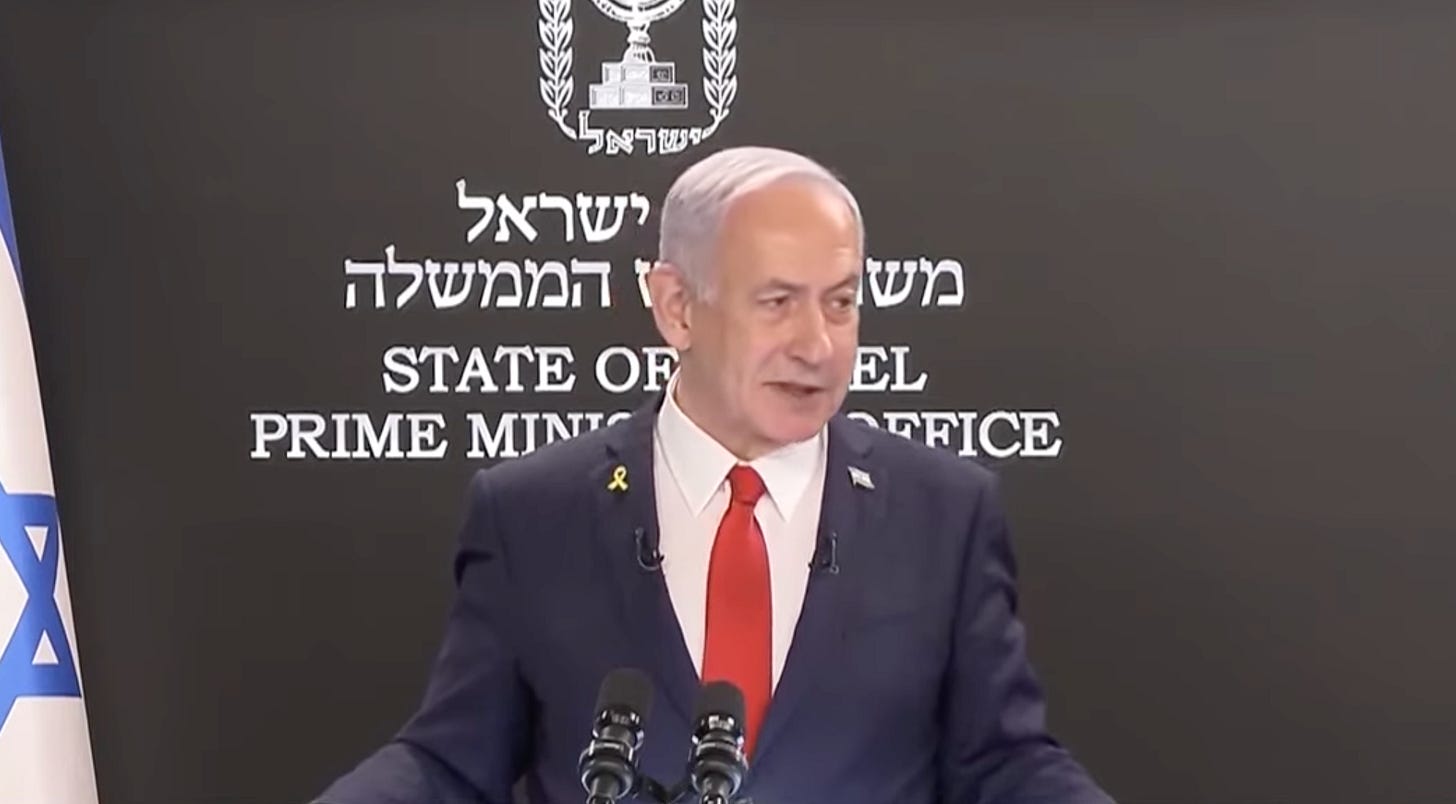Netanyahu Calls Countries Considering Palestinian State Recognition 'Deluded'
Israeli Prime Minister Benjamin Netanyahu sharply criticized countries including Australia for considering recognition of a Palestinian state, calling such moves "deluded" and warning they would bring war closer rather than achieving peace in Gaza.
Speaking at a press conference with foreign media, Netanyahu said countries supporting Palestinian statehood were falling for an "absurdity" and described the international push as "shameful."
"It defies imagination or understanding how intelligent people around the world, including seasoned diplomats, government leaders, and respected journalists, fall for this absurdity," Netanyahu said when asked about Canada and France's support for Palestinian statehood.
The comments came in response to questions from Middle East correspondent Matthew Doran about growing international pressure on Israel over its military operations in Gaza. Several Western nations have indicated they would support Palestinian state recognition in the coming months.
Netanyahu argued that recognizing Palestinian statehood would amount to rewarding Hamas for the Oct. 7 attacks on Israel, which he described as "the worst attack on Jews since the Holocaust."
"When you give them a Palestinian state, when they haven't abandoned the goal of destroying the Jewish state, all you're doing is you're bringing the next war closer," Netanyahu said.
The prime minister claimed Palestinians have historically rejected statehood offers because their true goal is destroying Israel rather than creating their own nation.
"The Palestinians were offered a state many times, including in the partition resolution, and they turned it down," Netanyahu said. "They turned it down, because the Palestinians are not about creating a state. They're about destroying a state."
He cited Hamas's control of Gaza as evidence, saying the militant group had "a de facto state" that it used "to launch a war of terror against Israel."
Netanyahu drew a distinction between Hamas in Gaza and the Palestinian Authority in the West Bank, but argued both organizations shared the same ultimate goal of destroying Israel through different means.
"Hamas in Gaza had a de facto state. It had state. And it used it to launch a war of terror against Israel because their doctrine is that the destruction of Israel should proceed with forceful and direct military and terrorist moves," he said.
He described the Palestinian Authority's approach as seeking to "reduce Israel to indefensible boundaries" through international institutions before "delivering the blow."
Truth matters. Quality journalism costs.
Your subscription to The Evening Post (Australia) directly funds the investigative reporting our democracy needs. For less than a coffee per week, you enable our journalists to uncover stories that powerful interests would rather keep hidden. There is no corporate influence involved. No compromises. Just honest journalism when we need it most.
Not ready to be paid subscribe, but appreciate the newsletter ? Grab us a beer or snag the exclusive ad spot at the top of next week's newsletter.
The prime minister pointed to recent Israeli public opinion as evidence of domestic opposition to Palestinian statehood. He said a Knesset vote several months ago on the possibility of a Palestinian state resulted in overwhelming rejection.
"We had a vote in the Knesset a few months ago about the possibility of having a Palestinian state, and the result was 99 to 9," Netanyahu said.
He claimed the vote represented "a very broad spectrum" of Israeli political opinion and reflected how "most of the Jewish public is committed, is against the Palestinian state for the simple reason that they know it won't bring peace, it'll bring war."
Netanyahu acknowledged that Israeli public opinion had shifted even more dramatically against Palestinian statehood since the conflict began, compared to pre-war polling that showed roughly 60-40 opposition among the Jewish population.
When pressed about international criticism of Israel's military operations in Gaza, Netanyahu defended the campaign as necessary and proportionate.
"When we do what any country would do, faced with this genocidal terrorist organization that has performed the worst attack on Jews since the Holocaust, I think we're actually applying force judiciously," he said.
He challenged critics by asking what they would do if similar attacks occurred "right next to Melbourne or right next to Sydney," suggesting Australia would respond with at least the same level of force.
"I think you would do at least what we're doing, probably, maybe not as efficiently and as precisely as we're doing it," Netanyahu told the Australian correspondent.
The prime minister acknowledged Israeli military casualties in the Gaza operations, saying "we've lost quite a few soldiers in that effort."
Netanyahu outlined his vision for resolving the conflict, proposing that Palestinians should have "all the powers to govern themselves in the places where they live and none of the powers to threaten Israel."
He said such an arrangement would require Palestinians to "reform their whole education system" and "reform their whole historical outlook" to accept Israel's existence.
"If they want to live here next to us, they have to stop seeking our destruction," Netanyahu said.
He argued that granting full Palestinian statehood would inevitably lead to conflict, predicting that "radicals" and Iran would take control of any Palestinian state established in the West Bank.
"You're going to have the radicals again take it over, Iran take it over, and start a war from improved boundaries," he said.
The prime minister dismissed international pressure, saying Israel would not change its position regardless of global opinion.
"We will not commit national suicide to get a good op-ed for two minutes," Netanyahu said.
His comments reflect growing tensions between Israel and some of its traditional allies over the conduct of the Gaza war and the broader Israeli-Palestinian conflict. Several European nations have indicated willingness to recognize Palestinian statehood as part of efforts to revive peace negotiations.
The push for Palestinian state recognition has gained momentum since the Oct. 7 Hamas attacks and Israel's subsequent military response in Gaza. Supporters argue recognition could help establish a framework for future negotiations and demonstrate international commitment to a two-state solution.
Netanyahu's forceful rejection of such moves underscores the deep divisions over how to address the decades-long conflict. His characterization of international supporters of Palestinian statehood as "deluded" represents some of his strongest language yet against allied nations considering recognition.
The Israeli leader's comments also highlight his government's hardline stance against Palestinian statehood, which has become even more pronounced since the current conflict began. The overwhelming Knesset vote he cited demonstrates broad Israeli political opposition to Palestinian state recognition under current circumstances.
The press conference took place as Israel continues its military operations in Gaza following the Oct. 7 attacks that killed approximately 1,200 people and resulted in the capture of more than 200 hostages. The Israeli response has resulted in thousands of Palestinian casualties and widespread destruction in Gaza.
International pressure on Israel has mounted over civilian casualties and humanitarian conditions in Gaza, with some allies calling for restraint while maintaining support for Israel's right to defend itself. Netanyahu's comments suggest little willingness to accommodate such concerns when it comes to fundamental questions about Palestinian statehood.
The dispute over Palestinian recognition reflects broader disagreements about the path forward for resolving the Israeli-Palestinian conflict, with Netanyahu's government taking an increasingly uncompromising position against the establishment of a Palestinian state.
Got a News Tip?
Contact our editor via Proton Mail encrypted, X Direct Message, LinkedIn, or email. You can securely message him on Signal by using his username, Miko Santos.
As well as knowing you’re keeping Mencari (Australia) alive, you’ll also get:
Get breaking news AS IT HAPPENS - Gain instant access to our real-time coverage and analysis when major stories break, keeping you ahead of the curve
Unlock our COMPLETE content library - Enjoy unlimited access to every newsletter, podcast episode, and exclusive archive—all seamlessly available in your favorite podcast apps.
Join the conversation that matters - Be part of our vibrant community with full commenting privileges on all content, directly supporting The Evening Post (Australia)
Not ready to be paid subscribe, but appreciate the newsletter ? Grab us a beer or snag the exclusive ad spot at the top of next week's newsletter.









